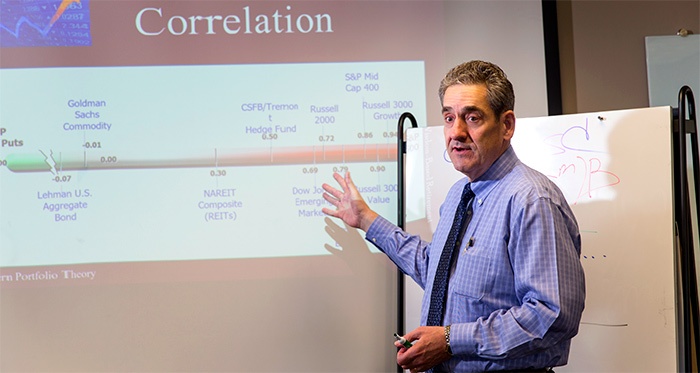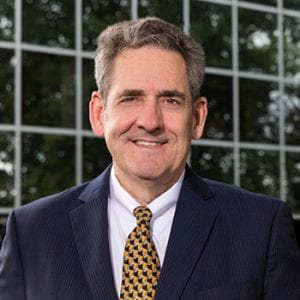Helping clients navigate an ever-changing financial landscape
Helping clients navigate an ever-changing financial landscape

Stephen Franklin, MBA, CFP, RICP, CFS, CEP • Louisville, KY
Kentucky Planning Partners (KPP) • LPL Financial
Read full biography below
Proactive Advisor Magazine: Steve, talk about the evolution of your practice and the clients you serve.
When I first became a financial advisor in the early 1980s, I explored several different areas for specialization. I became knowledgeable about cafeteria benefit plans and worked with school districts and hospitals, showing employers tax-efficient ways of implementing plans that would benefit their organization and their employees. I also developed an expertise in executive compensation plans.
At the same time, I was studying to become a Certified Financial Planner. I have a lifelong passion for continuing education, and, in addition to earning several industry certifications, I have pursued courses of study in finance, business administration, and global financial markets. This educational process made it clear to me that the future of the advisory business would be in delivering holistic financial planning for clients, understanding that all elements of an individual’s financial life need to be well-coordinated.
I have always gravitated toward spending time with people who are older than me. My grandfather, who was a pastor, has been one of the great influences in my life. I also used to go horseback riding in the national forest as a teenager with a great friend who was in his 70s. I came to realize that I shared common values with this older age group, and I was, coincidentally, living in a retirement mecca in Arizona. Retirees face very special challenges in their financial lives. Decisions at the start of retirement can have a profound impact. At the time I was starting my practice, retirees were starting to control increasingly more of the personal wealth in the United States. Dedicating my practice to retirees seemed like both a sound business decision and one that would be personally fulfilling for me.
Over the years, I have only come to believe more strongly in the wisdom of specializing. I think advisors who are generalists can certainly do a proficient job, but clients benefit from working with an advisor with deep knowledge of the specific needs of their life stage and the strategies that can address those issues. As baby boomers have grayed, the industry is beginning to recognize the profound differences between the pre-retirement accumulation stage and the post-retirement distribution stage. It is a very different dynamic, with an emphasis on detailed retirement-income planning and asset management that relies more heavily on risk management. Estate planning and eventual wealth transfer also need to be considered, which requires specialized knowledge for an advisor and the outside resources he or she brings to bear. I believe my years of focused experience serving retirees provide great value to my clients.

What are the components of your planning process?
I am dedicated to the Certified Financial Planner Board of Standards model for financial planning, which I have used since the beginning of my career. It is a disciplined approach with several distinct steps, which include defining the relationship, discovery and the setting of objectives, strategy development and implementation, and monitoring progress versus objectives. But there will be adaptations and areas of emphasis that we customize for the retirement years. Insurance planning, for example, is going to be very different for a retiree or retired couple than for someone with many more years of earning power and a growing family.
I think one of the points of difference in the way I approach financial planning for retirees is the amount of time and effort dedicated to the discovery phase. I will normally be face-to-face with a client for about a dozen hours before I think we can make our first reasonable recommendation. Going beyond the financials and getting to know a client on a personal level is critical to our process. I probe very deeply into who they are, what their goals are, and what motivates them. In this way, we can identify meaningful and realistic long-term goals and recommend integrated strategies across a range of financial needs appropriate to their specific situation. As an overlay to the entire process, I am focused on evaluating the tax efficiency of various planning options and will use the resources of a qualified tax professional when needed.
What is your broad approach to investment planning for retirees?
I think this is an area where our industry, in general, has been too wedded to the theory and practices of the past. Our process strives to add significant value in the ever-evolving global financial markets.
I believe we are in a post-modern-portfolio-theory world. Harry Markowitz published “Portfolio Selection” in March 1952. Obviously, he was drawing from a pool of data that predated his research, and this time frame represented a vastly different world than the one we live in today. These social and economic changes show up in virtually every area of daily life.
In the areas of investment selection and portfolio design, these changes are dramatic. One of the biggest adjustments has come from different correlational relationships between investment alternatives. Finding beneficial correlations may have been relatively easy in Markowitz’s day. Today, it is a major challenge. As a result, the average investor has experienced a much bumpier ride, which we have clearly seen in the last two major bear markets. As an industry, we are also struggling to add any significant upside benefit, or “alpha,” over market indexes.
 So how does this thinking impact recommendations for client portfolios in a broad sense? Of course, each client portfolio must be designed in a customized fashion to help them address their specific goals, according to their risk profile and their time horizon. In a general sense, however, we are seeking to find ways to achieve those beneficial correlations I just mentioned.
So how does this thinking impact recommendations for client portfolios in a broad sense? Of course, each client portfolio must be designed in a customized fashion to help them address their specific goals, according to their risk profile and their time horizon. In a general sense, however, we are seeking to find ways to achieve those beneficial correlations I just mentioned.
We work with a relatively small number of third-party investment managers who share this type of philosophy. Their actively managed strategies are quantitative in nature and comprehensive in the sense that we can blend them together and seek to achieve today what Markowitz was after in 1952. In a world where most financial products look and behave very much alike, we are seeking strategy diversification that can help mitigate risk and volatility.
This is very important to retirees, who should not be accepting of the risk of large drawdowns in their portfolios. For example, we may be able to construct a portfolio where our equity-to-fixed-income mix may be higher than the industry benchmark, but disciplined, rules-based strategies with beneficial correlational relationships potentially allow this to work in the market with significantly less risk. This will seek to provide the opportunity for enhancing upside growth over full market cycles. In addition, when we feel it is appropriate to use some allocation to more passive strategies, our recommendations lean toward factor-based strategies that seek greater alpha than their benchmark.
I believe this approach to retirees’ investment planning adds significant value, both from a purely financial perspective and in building the client-advisor relationship. It has been my experience that clients appreciate a forward-looking and sophisticated investment approach that is appropriate to today’s financial environment. As part of my educational approach with clients, I explain these types of concepts, and the fact that we live in a different investment era that demands different solutions.
“Our process strives to add significant value in the ever-evolving global financial markets.”
What do you think will differentiate successful advisors in the coming years?
I think one of the major issues facing our industry is the overall quality and caliber of financial advisors. This has ramifications across several areas, including the real, tangible value being delivered to clients and how advisors should be approaching the client-advisor relationship in a fiduciary manner. The value question has several components: (a) the expertise being brought to the financial-planning process, (b) the value being delivered in sophisticated investment planning and execution, and (c) having the advisor place “people over profit.”
We need financial advisors who are highly educated and knowledgeable, and who have the experience to understand the practical impact of the new global economic and financial landscape. In my opinion, modern portfolio theory is still being swallowed hook, line, and sinker by the industry. It supports nearly everything that comes out of Wall Street from both a product and marketing perspective. When Markowitz won the Nobel Prize in 1990, the “Kool-Aid” began to flow, and I think it is still being dispensed today.
My personal solution? I place personal values and providing value to clients as the two highest priorities of my practice. I cherish family, faith, integrity, the continual seeking of knowledge, and the provision of exceptional service and guidance to clients. Combining those values with a modern outlook on the financial world have been the cornerstones of my practice. I believe this philosophical and practical approach has helped lead to strong and enduring client relationships over the years and will continue to do so in the future.

A lifelong passion for knowledge creates a better advisor
Stephen Franklin of Kentucky Planning Partners (KPP) has been an independent financial advisor since 1984. He says that he is always involved in a “passionate effort to keep abreast of the latest trends in the very big world of global finance.” Mr. Franklin has taken several steps to build and refresh his knowledge base in seeking to benefit his clients. He recommends the following:
- Conduct research on the many professional designation programs available to financial advisors. Select first those with the most immediate relevance to your practice and any areas of personal specialization.
- Take advantage of continuing education programs, webinars, and conferences.
- Consider enrolling in graduate-level certification programs in academic areas such as finance and securities analysis.
- Develop your own disciplined research and reading program to stay current on developments within the industry and the overall economic and business landscape.
- Give back to your community by teaching financial education classes to college-level students, senior citizens, and/or the public at large, focusing on your areas of expertise.
Recent Posts:
 Stephen Franklin is a senior wealth-planning strategist at Kentucky Planning Partners, located in Louisville, Kentucky. His specialty is financial planning for retirees, who, he says, “face many threats and risks to prudent financial management.” His objective is “to help negotiate these challenges for retirees so they can enjoy life.”
Stephen Franklin is a senior wealth-planning strategist at Kentucky Planning Partners, located in Louisville, Kentucky. His specialty is financial planning for retirees, who, he says, “face many threats and risks to prudent financial management.” His objective is “to help negotiate these challenges for retirees so they can enjoy life.”
Mr. Franklin grew up in Arizona, where his father was a financial advisor. Mr. Franklin served in the military and worked in law enforcement in California. He says he decided to “take the leap” in 1984 to pursue his true career objective in the financial-services industry. He has been an independent financial advisor since then. Says Mr. Franklin, “Over the years, I have worked to continually expand my knowledge base and apply that in seeking to benefit my clients.”
Mr. Franklin has impressive educational and professional credentials, starting with an undergraduate certificate in personal and family financial planning from Cerritos College and a bachelor’s degree in management from the University of Phoenix. He is a Certified Financial Planner (CFP), Certified Fund Specialist (CFS), Retirement Income Certified Professional (RICP), and Certified Estate Planner (CEP). He has earned graduate certification in international financial and global markets from Georgetown University and in securities analysis from the New York Institute of Finance. He holds an executive master’s degree in business administration (international management) from Western International University.
Mr. Franklin and his wife have two adult daughters and one granddaughter. He enjoys family activities, the outdoors (especially the beach), long bike rides, and reading and research. He teaches financial-planning courses at the graduate level and for retirees at Bellarmine University. Mr. Franklin is active in his church and has earned master’s degrees in religious education and pastoral education.
Disclosure: Securities offered through LPL Financial, member FINRA/SIPC. Investment advice offered through KPP Advisory Services LLC, a registered investment advisor. KPP Advisory Services LLC and Kentucky Planning Partners are separate entities from LPL Financial.
The opinions voiced in this material are for general information only and are not intended to provide specific advice or recommendations for any individual. All performance referenced is historical and is no guarantee of future results. All indices are unmanaged and may not be invested into directly. There is no guarantee that a diversified portfolio will enhance overall returns or outperform a nondiversified portfolio. Diversification and asset allocation do not protect against market risk. Investing involves risk, including loss of principal.
Photography by Chris Cone

